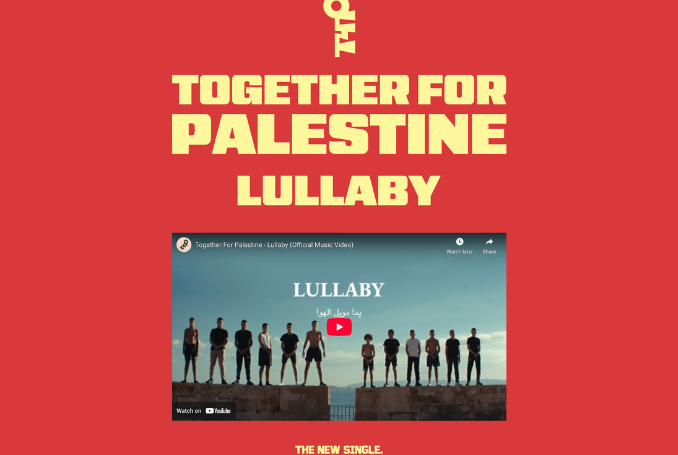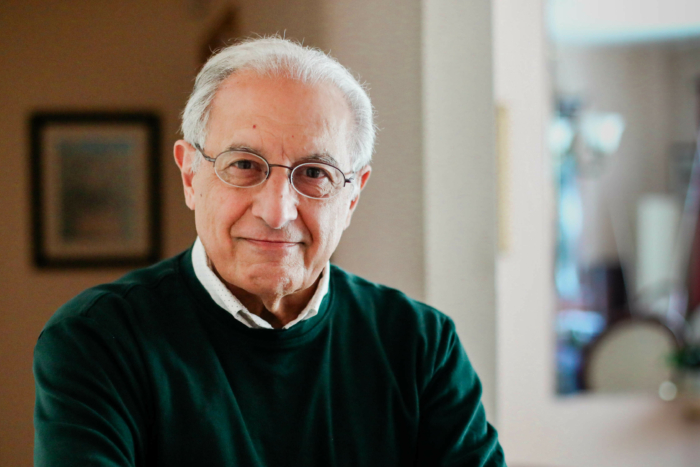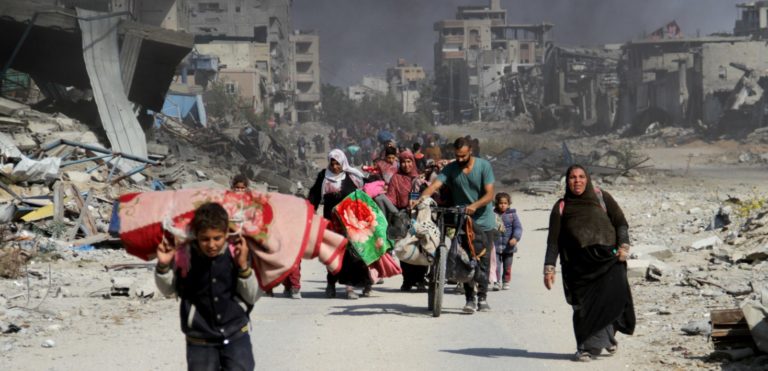After the Second World War, the watchword was: “Never again! “. No more world wars! No more genocides! From now on, we aim for peace and international security: international law, therefore, serves as a reference to regulate relations between States. The United Nations, created in 1945, adopts the Universal Declaration of Human Rights. States represented in the UN General Assembly can submit their legal disputes to the International Court of Justice, and the General Assembly can obtain a legal opinion from the Court on any contentious issue. The U.N. Security Council is responsible for the maintenance of international peace and security. There will certainly be wars, but everything is being done to ensure that there will never again be world wars.
In the wake of the creation of the United Nations, David Ben-Gurion declared the independence of the State of Israel on May 14, 1948. At the time, the creation of Israel was seen as a desirable response to the ‘Jewish question’, that is to say to the disregard or refusal of the nation-states of Europe to integrate the Jewish Europeans living within their national borders. Due to the difficult accession to national citizenship for these minority groups, anti-Semitism grew within the national majority of each nation-state, producing the Dreyfus Affair in France and numerous pogroms in Russia, Germany, Austria, Romania and the Balkans. In Germany, anti-Semitism led to the Holocaust.
The creation of Israel was to definitively settle the Jewish question, and an international consensus took shape after the Second World War. A key date in this consensus was November 29, 1947. On that day, the U.N. General Assembly adopted Resolution 181, the Partition Plan for Palestine. This plan partitioned Palestine into two states[1], one Jewish and the other Arab.
Since the adoption of R-181, questioning this solution raises eyebrows. Indeed, can we reasonably oppose sharing? Can we reasonably oppose good neighborliness, that of the Jewish State of Israel and the Arab State of Palestine? Questioning this is tantamount to unreason, a serious lack of sensitivity, even proof of anti-Semitism…
But does the international legitimacy of the two-state solution and its aura of reasonable compromise stand up to rational scrutiny? To answer this question, let’s do the ‘doorbell test’. To do this, a proposed scenario…
| Joseph is at home. He hears the doorbell ring. “Hello,” he says as he opens the door. The person at the door tells Joseph that two centuries ago, the person’s family lived in the house. As a result, the house does not really belong to the residents, he explains. “The residents will be able, if they wish, to continue to live in the house in certain rooms.” Joseph smiles politely, thanks the bell ringer for his visit, and politely sends the person off as he closes the door. “What quirky logic!” says Joseph to himself, returning to his business… The next day, the same man rings the bell, but this time he is accompanied by a policeman. The latter explains to Joseph that by virtue of the rights of the bell ringer as established by majority vote in the City Council, the house will now be shared. “The majority of the rooms in this house belong [to the ringer] “, explains the policeman. “You can continue to live in the house, but you will have to respect the duly established distribution of rooms”. Joseph is dumbfounded; he pulls himself together and explains to the policeman that he is the legal owner of the house, and that he has no obligation to share his house with anyone. The policeman explains that he will have to use force if Joseph does not comply with the decision of the City Council. Joseph once again contests his dispossession but realizes that it is a waste of time: he enters, prostrate, into an authorized room. “My neighbors know me well,” Joseph said to himself. “They will surely help me”. Indeed, the neighbors intercede with the ringer, but they end up resigning themselves to the situation. Joseph phones the Ministry of Municipal Affairs, but his efforts are in vain: the sharing of the house by the City Council is deemed legal by the Ministry. Hoping that a higher court will one day recognize the legitimacy of his cause, he keeps all the documents proving that he is the owner in good standing of the house. Joseph’s neighbors support his cause, but over time some come to regard the doorbell ringer as the rightful owner of the house. In the neighborhood, people deplore the fate of Joseph, especially that the doorbell ringer now leaves him only a small room in the house. Over time, the doorbell ringer even occupies Joseph’s small room; only a corner of the room remains for Joseph. The ringer finds his own gesture magnanimous: “Nobody in the world would accept that an outsider would live in one’s own home”, he grumbles. The ringer speaks openly of the impossible cohabitation with the “intruder”, and of the need for his eviction. |
What happens to Joseph is what has happened to Palestine.[2] If you are disturbed by what is happening to Joseph, and if you find the division of the house legitimate, you are faced with a dilemma. Either you support the principle of the house belonging to Joseph, or you support the partition of the house, but you cannot support both.
The ringing test asks the following question: can we justify the partition of a house belonging to, in this case, Joseph?
A more equitable division of the house between Joseph and the doorbell ringer may improve Joseph’s situation (and upset the bell ringer), but to argue that Joseph’s title deeds do not matter is contrary to the principle of reciprocity (“what’s good for the goose is good for the gander”). Indeed, if it is unacceptable for your house to be divided, why would it be acceptable for Joseph’s house to be divided?
Invoking the horrors experienced by the ringer is all very well, but why put the responsibility for these horrors on to someone else? Why should Joseph pay for the injustices committed by another? Why this Kafkaesque reality?[3]
The reality of Joseph is, in fact, that of the Palestinians. Either you recognize the title deeds of the Palestinians, or you don’t. In the second case, you support the dispossession of the Palestinians. If you are accommodating to Palestinians, you support minimal dispossession; if you are unaccommodating to them, you support maximum dispossession. But whether you are a minimalist or a maximalist, you support Palestinian dispossession…
The doorbell ringing test reveals that the international legitimacy of the two-state solution is not self-evident, that the aura of reasonable compromise is highly problematic. If you are in favor of the principle of “sharing” Palestine, how can you justify it when the doorbell to your house rings?
***
A great injustice has been done to the Palestinian people. But the principle of reality is tenacious: Israel is real, and the privileged citizens of the State of Israel[4] are not going to abolish their state or expatriate en masse. You can rewind a thread, but you cannot rewind the thread of history.
If, in principle, the house should be returned to the Palestinian people, in practice there is an Israeli state and an Israeli people… How, then, can the house be returned to the Palestinians? It must be recognized that Israelis see their state as their home. Indeed, after 75 years, they are still not the owners in good standing of the house, but they are now part of the house.
The day will come when Palestinians and Israelis will come to a stalemate, a political dead-end, as was the case in apartheid South Africa. The Black population had indeed resolved to fight collectively against white domination and its apartheid regime, and when the South African government realized that it was in a political impasse, it then began secret negotiations with Nelson Mandela, the historical leader of the A.N.C. (African National Congress) to get out of the quagmire. When the day of the stalemate comes to Israel-Palestine, similar negotiations will begin…
The Palestinian negotiators could then formally offer their Israeli counterparts a formal (pre-constitutional) guarantee that the Palestinian house would house all the Palestinians, that a Palestinian democratic state, from the river to the sea, from the Jordan to the Mediterranean, would be the State of all. In this house, both ethnic Palestinians (indigenous Muslims and Christians) and settler Palestinians (Jewish Israelis) would be citizens. Many Israelis would probably prefer to leave the Arab world rather than integrating, but those willing to unpack and become Arabic-speaking Palestinians[5] would be full citizens of the Palestinian state.
Obviously, such an offer will be refused! The fear of the Israelis is that the protective Iron Wall[6] will crumble, and that “savage” Palestinian hordes will throw the Jews into the sea.[7] This fear must be acknowledged and responded to. Reassuringly, Israelis must be told that it is not the presence of the Jews in Palestine that is the problem, but rather the Iron Wall. Indeed, if the ethnic cleansing of the Palestinian people is unacceptable, conversely the ethnic cleansing of the Israeli people is just as unacceptable.
For such a Palestinian offer to be likely to be considered at all, the assurance of a peaceful transition will have to be credible. How, then, can the Israeli negotiators be reassured that the transition will certainly be bumpy, but without hostilities?
There is, of course, the South African precedent. South Africa was able to transition from an apartheid and exclusionary regime to a democratic and inclusive regime. What was crucial for the white Afrikaner minority was the feeling that the change would not be bloody. But invoking this precedent will not be enough…
What is needed here is a Palestinian program as clear as the anti-apartheid program in South Africa: yes, we must reject colonialism and supremacy, but not those having benefited from it. To put it plainly: Palestinian national liberation excludes ethnic cleansing and includes the equality of all citizens, regardless of ethnicity, religion or otherwise.
Establishing this Palestinian program will require the Palestinian people to reclaim their political system. Indeed, Palestinian politics is, by design, mired in a so-called peace process.[8] The international community must allow the Palestinian people to reclaim their political system.[9]
*Of Palestinian origin, Denis Kosseim is a Canadian citizen born in Montreal, Quebec. He teaches philosophy at Cégep André-Laurendeau in Montreal. He is also on the PAJU executive committee.
[1] In fact, the U.N. provided for two states as well as a corpus separatum, an international entity made up of Jerusalem and the surrounding area. At the time, the newly founded U.N. even considered installing its Headquarters in this corpus separatum
[2] See KHALIDI, Rashid, The Hundred Years’ War on Palestine: A History of Settler Colonial Conquest and Resistance, 1917-2017, Metropolitan Books, 2020.
[3] The main character of the novel The Trial, by Franz Kafka, is called Joseph (Joseph K.).
[4] See the report by B’Tselem, Israel’s leading human rights organization, titled: “A regime of Jewish supremacy from the Jordan River to the Mediterranean Sea: This is apartheid.”
[5] Hebrew would continue to thrive in a future Palestinian state, but Arabic would be the common public language.
[6] Zeev Jabotinsky wrote an essay in 1923 entitled “The Iron Wall”. Jabotinsky founded the revisionist movement, a branch of Zionism according to which only a preponderant military force (a wall of bayonets, therefore of iron) will allow the establishment and maintenance of a State of the Jews in Palestine. Today, both in breadth and depth, the revisionist movement dominates the Israeli political scene.
[7] https://www.haaretz.com/2012-07-06/ty-article/whos-throwing-who-into-the-sea/0000017f-db72-d856-a37f-fff2fb4e0000
[8] See https://al-shabaka.org/briefs/thirty-years-on-the-ruse-of-the-middle-east-peace-process/
[9] Ibid.





